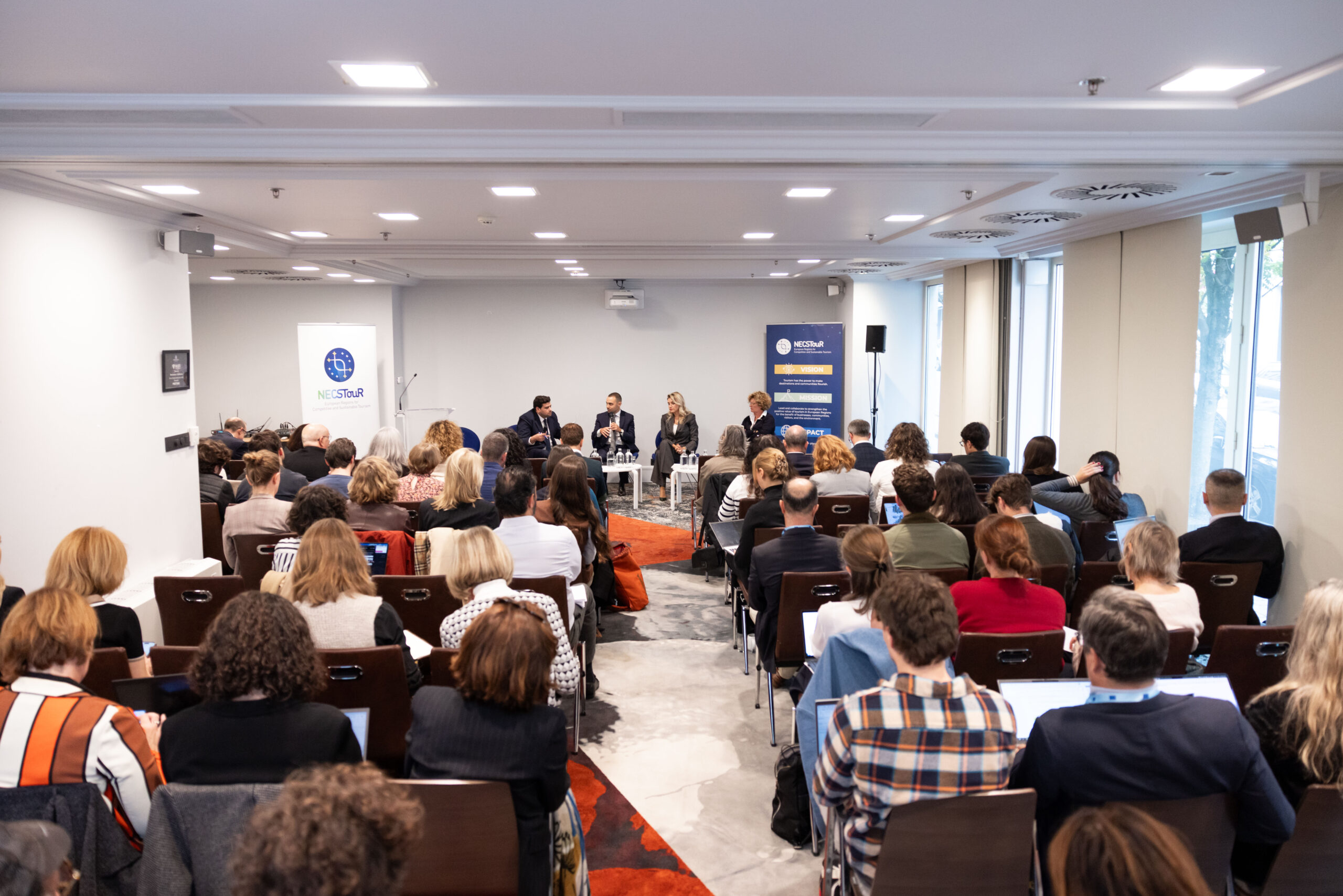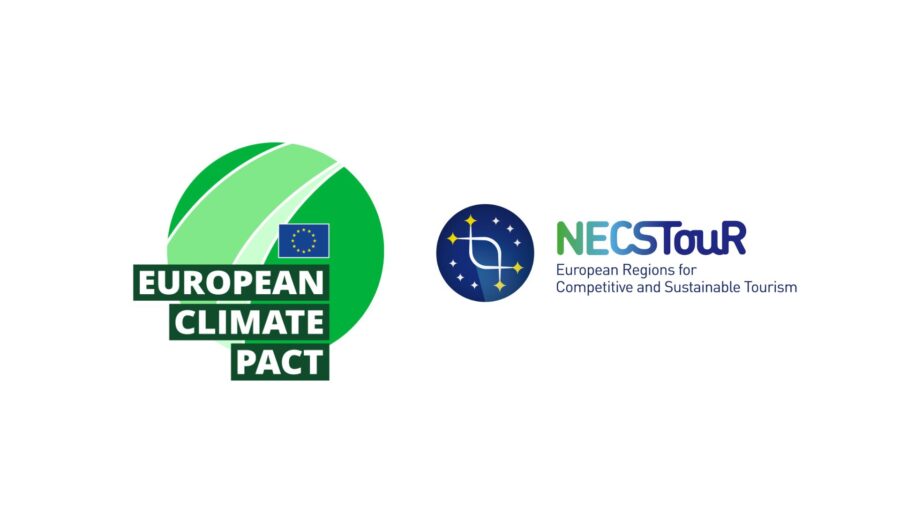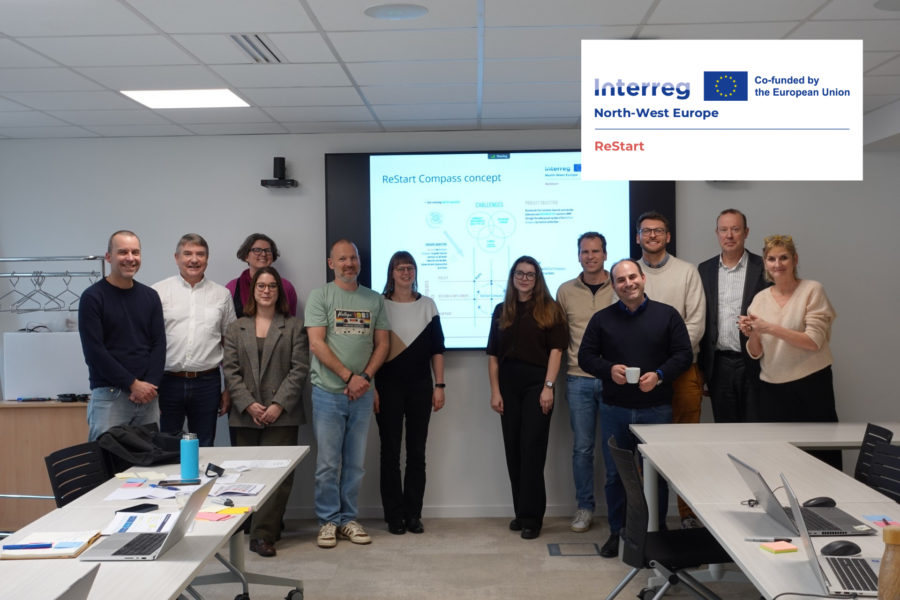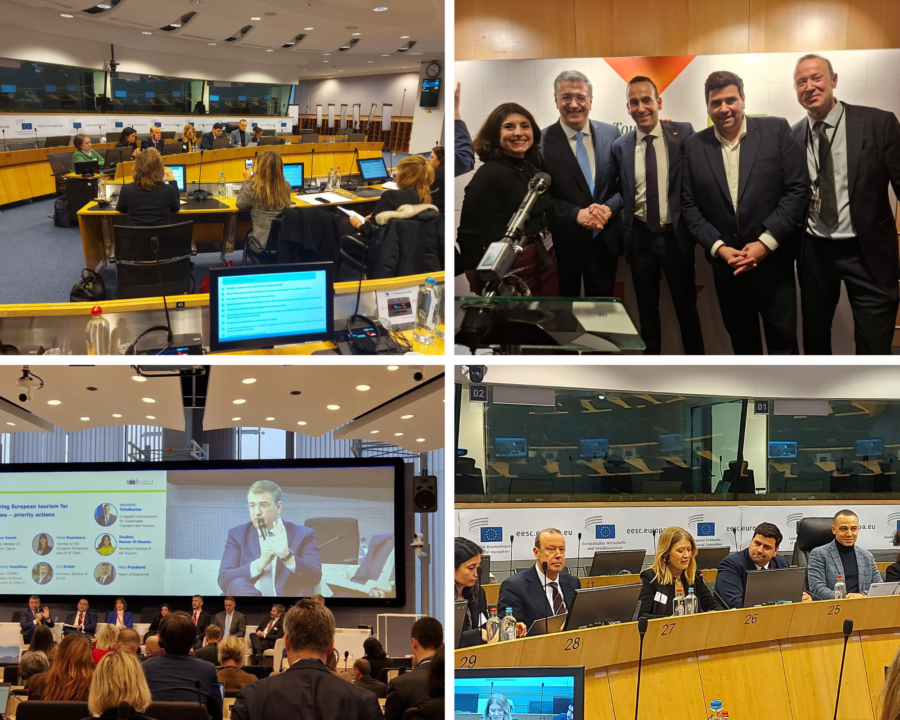

NECSTouR’s event in Brussels as part of the European Week of Regions and Cities facilitated a high level political debate with practical case studies from regions and cities
“Our goal is not to discourage or reduce tourism but to manage tourism better in smarter, fairer, and more sustainable ways. Tourism must be part of the solution.” Ana Moniche on behalf of the NECSTouR Presidency.
Delegates were welcomed by NECSTouR’s Executive Vice President Mathieu Cuip from the region of Ile-de-France.
An opening address was given by NECSTouR’s Presidency Ana Moniche from Turismo Andaluz on behalf of President Elena Baena highlighting that our goal is to manage tourism better in smarter, fairer & more sustainable ways: tourism can be part of the solution. Reference was made to the new European Tourism Strategy to be published next year and that this is a great opportunity to make tourism stronger, greener, and fairer. With a first ever Commissioner for Transport and Tourism, Apostolos Tzitzikostas, in post, the timing is right with greater tourism focus at European level. Ana stated NECSTouR’s hopes that the new strategy & the next Multiannual Financial Framework (2028-34) will bring clear actions and real support for regions and destinations. She also commended the valuable work of the European Committee of the Regions of the Regions’ Opinion on Sustainable Tourism led by NECSTouR member the Balearic Islands which is providing strong regional input to the European debate. Local and regional authorities are ready to lead by example.
A political debate followed with high level EU institutional speakers moderated by Mathieu Cuip. The panel comprised:
▪️ European Commission Deputy Director General of DG MOVE Maja Bakran who looked ahead to the new European Tourism Strategy due out next year and stated that a number of flagship areas for intervention are being identified by the European Commission.
▪️ Elena Kountoura MEP Vice Chair Committee on Transport & Tourism, & Member of the European Parliament Tourism Task Force (TTF): stated that regions face challenges in sustainability, resilience, and infrastructure. Climate impacts, extreme weather, and economic difficulties also affect local communities’ well-being.
▪️ Daniel Attard MEP Member of the Committee on Transport & Tourism talked about his work as Rapporteur of the upcoming TRAN report 2025/2120 (INI) for European tourism – destination management & regional tourism growth: “Enhancing connectivity, preserving cultural heritage and driving local excellence in European tourism – destination management and regional tourism growth”. He stressed the need to create better connectivity also for tourism and that connectivity is a fundamental right not just for tourism but also for cities and regions in general, helping authorities better manage tourists. Daniel stated that we have to invest not only in train but also in air and maritime because island states depend on these modes of transport.
▪️ Nikolina Brnjac MEP Member Committee on Transport & Tourism, & Shadow Rapporteur on the aforementioned report stressed that communities need to be satisfied with tourism and that it brings economic benefits at community level because if they cannot see these it creates a tension. She insisted on management and marketing plans and advocated a holisitic approach using a sound methodology to build a destination’s management plan. Evidence based policymaking drawing on tourism data is vital to support positions. Local surveys of residents are important.
A second session gave the floor to five practical case studies. Max Granström from Visit Skåne AB Smart Nature: balancing visitor flows through “Uncrowded”. Growing visitor numbers have placed pressure on its diverse natural landscapes, causing congestion, environmental degradation, and reduced visitor satisfaction. To address this, Visit Skåne launched the Smart Nature initiative, a data-driven project inspired by smart city principles and designed to balance visitor flows in nature. The project aims to develop and test digital tools that help manage visitor numbers, reduce environmental wear at popular sites, and improve the visitor experience through informed choices about when and where to travel. From 2022 onwards, Smart Nature has evolved through workshops, pilot studies, and MVP testing of the digital service Uncrowded, which provides real-time and forecasted information about visitor pressure at key natural destinations. The platform uses parking sensors, artificial intelligence, and weather data to show levels of crowding, encouraging visitors to choose less busy times or places. Expected outcomes include reduced environmental strain, lower CO₂ emissions, and improved visitor satisfaction, as well as the spread of tourism benefits across a wider geography.
Nature Tourism Flanders’ Els Brouwers from Toerisme Vlaanderen – VISITFLANDERS: Under the Travel to Tomorrow vision, Visit Flanders promotes a model of tourism that strengthens the harmony between visitors, residents, entrepreneurs, and the natural environment. The Flanders Naturally theme focuses on developing and promoting nature-based experiences such as walking, water activities, and micro-adventures that contribute positively to biodiversity and landscapes. Central to this strategy is the development of the Flemish Parks, a network of large-scale, long-term projects co-managed by five Flemish government agencies, local authorities, and Visit Flanders. Each park operates under a masterplan with structural funding, integrating tourism development, conservation, and accessibility. This collaborative framework ensures that tourism adds value rather than pressure, guided by knowledge sharing, monitoring, and bottom-up participation. The initiative’s goals are to create flourishing destinations, distribute tourism more evenly across space and time, and encourage responsible, nature-positive practices.
Aránzazu Urbina from Madrid on the “Territorial Tourism Governance Model in Madrid Region”. The Community of Madrid is developing a sustainable and regenerative tourism model based on coordination, innovation, and territorial cohesion. Its approach connects municipalities and stakeholders through a network of four Tourism Innovation Centers that cover 110 municipalities and act as intermediaries between the regional administration and local actors. The model’s core objectives are to foster sustainable tourism, strengthen rural and cultural assets, promote circular economy principles, and enhance cooperation across public and private sectors. Current projects include the Madrid Rural Destination brand, which unites rural destinations under a shared identity, the promotion of local products, the implementation of carbon footprint measurement tools, and the development of sustainable mobility options such as cycling networks. By applying environmental clauses to tourism grants and integrating bottom-up participation, the region ensures that development remains equitable and community-driven.
Martine Guélasse from Centre-Val de Loire Region on “From Spotlight to Constellation: Bourges 2028 as a lever for ‘Better Balanced Tourism’.” Bourges has been designated the European Capital of Culture in 2028 which will serve as a catalyst for better balanced tourism. Anticipating a doubling of visits to around two million, the regional strategy focuses not on crowd control but on designing an inclusive, low-carbon tourism model that distributes visitors across time and space. The initiative links cultural venues through an accessible urban corridor, upgrades the station forecourt into a multimodal mobility hub, and promotes slow, sustainable itineraries such as La Loire à Vélo and regional walking routes. With over 400 citizen-led projects already mobilised, the Bourges 2028 framework extends tourism beyond the event year through a year-round cultural calendar that strengthens the shoulder seasons. Coordinated by the CRT Centre-Val de Loire and the Bourges 2028 Tourism Taskforce (B28), the approach integrates infrastructure planning, hospitality standards, and a one-stop booking system to transform a temporary peak into lasting value for residents, busineses, and visitors.
Jelmer Peter from City of Amsterdam “Balanced Urban Tourism in practice” In Amsterdam, the city authorities have put balanced urban tourism policies into practice. Jelmer took the audience through the urban challenges, regulations, local instruments and the complex policy making field that is tourism in 2025 and concluding with the open question: who actually holds tourism management power?


